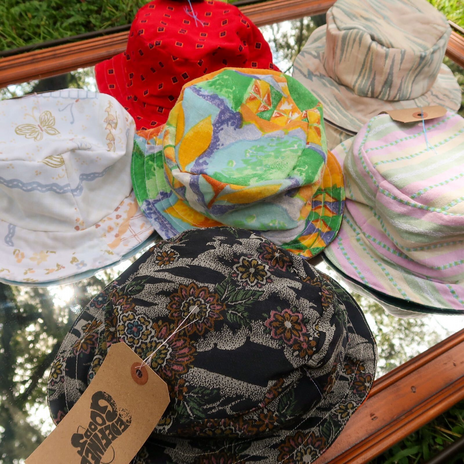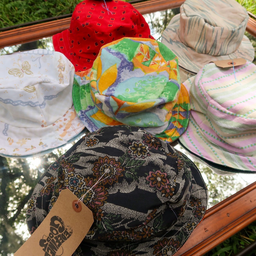University of Florida freshman Mia Crisostomo felt lost in her competitive major.

“I don’t want to run this race,” she told herself. She had yet to escape the mindset of conformity that stifled her creativity in her International Baccalaureate high school in Orlando, Florida.
After she completed her first year, a friend recommended a piece of literature to lighten her mental load: Robert Greene’s “Mastery.”
The novel detailed the paths to finding success, and one resonated with the dissatisfied teen: If you want to discover your passion, think about what you did as a child.
Crisostomo, now a 21-year-old UF senior, ran with that advice. Equipped with her childhood memories of sewing with her mother, she founded Redefined Goods in the summer of 2018.
Redefined Goods is a social-media- and market-based sustainable fashion brand, she explained. She began her business by selling clothing from thrifted materials, but it wasn’t until she started selling repurposed bags that she realized the influence of her company.

“The moment I realized it was becoming a bigger thing was when there were a few days within a week where people sent me pictures of others wearing my bags on campus,” she said. “My name is out there enough that people know to contact me, and then it becomes like a snowball effect.”
Crisostomo said she quit her minimum-wage job, changed her major to sustainability studies and marketing and began to pursue a career that gave her a sense of purpose and pride.
“Being able to take that step and quit my job and pursue something that I actually cared about was really empowering and just something that I’m grateful that I was able to do so young,” she said.
While she did not expect the broad impact that her brand has had, Crisostomo discovered her entrepreneurial spirit at a young age, she said.
When she was 9 years old, her mother, who Crisostomo considers a “Jill of all trades,” taught her to sew and crochet, she said. Her parents, both immigrants from the Philippines, instilled the value of resourcefulness in Crisostomo and her younger brother.
“Both my parents were born and raised in a third world country,” she said. “They just have that mindset of frugality that has definitely impacted the way that I view things, and they’re just very much more value-oriented versus spending a bunch of money to get a bunch of nice things.”
In the Philippines, her father’s family owned a thrift shop and lived on the floor above their workplace, Crisostomo said.
“He showed me that old stuff is cool still,” she said.
Her wardrobe was filled with bright, thrifted clothes long before she understood sustainability, she said. In the sixth grade, she took her passion for fashion to the next level.
With her mother’s help and guidance, she began to sell crocheted hats, phone cases and iPad cases at school and on Etsy, she said.
“Even from very young I was kind of used to the idea, or comfortable with the idea, that I know how to make things, and I know that people are willing to buy them,” Crisostomo said.

In high school, Crisostomo said she felt her imagination slowly diminish and her clothes become “boring and normal.”
“Living in the suburbs, I didn’t spend a lot of time outdoors,” she said. “I think IB just sucked the creative out of me.”
However, the move to Gainesville, Florida, introduced her to the beauty of nature, which inspired her to take interest in sustainability and reawoke her childhood love of creating.
“I think living in Gainesville exposed me to just outdoor recreation in general, which led me to major in sustainability and really integrate that into Redefined Goods,” she said.
When Crisostomo started Redefined Goods, she worked alone, she said. Each bag, built in an assembly-line style, typically takes her an hour to sew.
However, as she started broadening her sales to art markets, the young entrepreneur recruited a helper: her then 16-year-old brother.
Miguel Crisostomo, now a 17-year-old high school senior, is an artist as well. He said he tends to focus on digital and watercolor art, but he learned to sew on a sewing machine in the fifth grade.
He said he discovered he had a knack for making bucket hats last summer, and his sister recruited him to help with the shop.
“It makes me proud, honestly, knowing that I’m related to her and knowing that I can participate in that success and help her with it,” he said.
While Crisostomo said she does not remember her early sales, a moment that impacted her as an entrepreneur was the first time a brick-and-mortar store sold her tote bags.
As she walked through the doors of Life Unplastic, located at 2441 NW 43rd St., she clung nervously to the five bags in her arms. Standing in the shop, she presented her pitch.
The process was unexpectedly simple, she said. The owner gladly purchased Crisitisomo’s products and displayed them in the shop.
“It’s not like I had to fight every step of the way,” she said. “I realized people like the bags.”
Tommy Davis, a 22-year-old UF psychology and behavior analysis senior, has liked the bags from the beginning, he said. The first item he purchased from Redefined Goods was a blue tote bag that stood out to him for its masculine feel.
“I think it’s really cool that Redefined Goods recycles clothing in an innovative way,” he said. “It’s not just reselling old clothing but re-stitching and making old clothes into new products or old clothes that people may not wear or old fabric that may not be bought.”
Davis met Crisostomo in his sophomore year of college, he said. The pair sat in the same spot on campus every day for Krishna Lunch — where Crisostomo first told him her plan to start a sustainable fashion brand.
He said his favorite piece of Crisostomo’s work was a gift she gave him after he spent the summer in Japan. Davis brought back five thrifted kimonos, and Crisostomo turned the plethora of pieces into one reversible bucket hat.
Davis said he values Crisostomo as a friend, a creator and a business owner, and he stressed the importance of supporting local businesses.
“It supports people’s livelihoods,” he said. “I know I’ve watched Mia work before, and she does put in the work, and she makes a profit off of it. It’s not just going to corporations that may not care about the environment.”
Through her three years as a sustainability studies and marketing double major, she has observed contradictions between her two courses of study.
“My sustainability courses are very much supportive of doing something like what I’m doing — working for myself and having a sustainable business,” she said. “But I feel like with my marketing classes, everything’s just very geared toward pushing you into getting a corporate job.”
Crisostomo added that others who dream of becoming entrepreneurs should chase their goals, regardless of what others may think or perceive of their success.
“At the end of the day, I know that I’m doing what I want to do,” she said. “Those feelings [of insecurity] are just me wanting to conform and wanting people to think that I’m successful when that doesn’t matter at all. It’s about doing you.”


